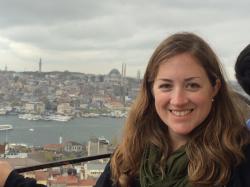Job Hunting After Two Years of Travel: Four Tips for Re-entry
May 26, 2016
Last April, as I sat in an open-top Jeep watching wild lion cubs cavort in a national park in India, it never occurred to me that the top of my resume looked like metaphorical Swiss cheese—full of holes. A month later, riding a skittish horse through the Rose Valley in Cappadocia, Turkey, I didn’t consider for a second whether I still fit into my suits, which I’d haphazardly stuffed in a box and stored at a friend’s place with the rest of my earthly possessions. Gazing at a night sky in Oregon filled with more stars than you see in a thousand nights in New York, I wasn’t thinking about how I’d someday answer the question, “Are you sure you’re ready for a permanent job?”
In May of 2014, I finally did what I’d been wanting to do for years: I left my stable, respectable position as an associate attorney at a firm in New York and took off on a two-month road trip around the U.S. Over the following two years, I traveled the country and the world, returning for a few months each winter to work as a temp lawyer (at my former firm) to make money for the next adventure.
But then, this past February, my travel goals—which I’d saved for and worked towards for seven years total—were achieved. My last major trip, a six-month sojourn around the globe, ended. And while I had an incredible time, it was never my plan to leave the world of traditional employment forever (mostly because I can’t afford to, as I was not miraculously discovered by a casting agent looking for the perfectly sunburnt, out-of-shape woman with no discernible talent). Now, I’m facing a new challenge—hunting for a job with a sizable gap in my resume.
In preparation for my trips, I read countless books and articles and blog posts (like this and this) about leaving work to travel. A wealth of information exists about how much to save and how to plan and what to pack and where to go. But what happens when your trip is over and it’s time to go back to work?
Full disclosure: I don’t have a new job yet. But I’m well into the process, and have learned a few valuable lessons that (1) helped me get my foot back in the door, and (2) will, fingers crossed, help me land a gig soon.
1. Network.
Holy hell, do I hate “networking.” But as it turns out, sometimes networking just means kind of staying in touch with old friends or people you used to work with. I’ve gotten a number of interviews because partners at my old firm have passed along my resume, with personal recommendations, to clients who are hiring. Also, now that I’m an Old, some of my friends have managed to land pretty cool jobs, and are becoming more senior in their workplaces—a real benefit when you need someone reputable to shove your resume under the nose of the right person.
When I sought the advice of Angela, the chief talent officer at a law firm in Manhattan, she suggested using connections to set up informational interviews (i.e., meetings with people who are not necessarily hiring at the time), especially if you’re thinking about switching industries. She also stressed the importance of staying in touch with these people after you meet them. Writing emails to people I barely know makes me cringe (and, even worse, can feel disingenuous), but it’s not that difficult: One way to make communication seem more natural is to keep an eye on what the person is up to, and send a congratulatory email about a promotion, or questions about certain changes in the company. If you discuss things in your informational interview that merit a follow-up—like an update on the outcome of a suggestion they gave you—then do it.
2. Maintain good relationships with your prior employer.
Do not burn bridges at your old job when you quit. I know you might feel an intense yearning to slap your boss straight across the face before you storm out, but this is not a good idea (and also, it’s criminal battery). First of all, you’ll need to stay in your former colleagues’ good graces to get references for future jobs. Second, there’s a strong chance that people at your previous job can help you find your next one. Hell, they might even offer you your old job back, if you want it (the friend I traveled with in 2014 has left the same wealth management firm at least three times to travel, and they keep re-hiring him afterwards). Additionally, good relationships with past employers look good to future employers. One HR person who was interviewing me noticed that I had worked at the same firm during each interlude between trips, and said that it made her less concerned about my employment gap. (She said she’d be more worried if I’d worked at a new firm in between each travel stint.)
3. Be explicit about your travels on your resume or cover letter.
At the top of my resume is the law firm where I worked most recently, with several dates—the dates that I was a full-time associate, and then entries for each stint I worked during the winters of 2014 and 2015. When I spoke with Stacey, a recruiting specialist at a financial services fund, she said that gaps on a person’s resume won’t stop her from passing it along to the hiring manager—but she does expect the reason(s) for those gaps to be addressed, either on the resume or in the cover letter. She suggested that I include my trips in the “interests” section of my resume: “Traveling in southeast Asia (May-July 2015),” for example. Meanwhile, Angela suggested that I make it clear in my cover letter (or other correspondence) that while I enjoyed my time off, I’ve had a period of reflection and am now fully committed to finding a permanent job.
4. Prepare to be extra-convincing in your interviews.
You will need to show people with complete sincerity that you are ready to work full time again. In almost all of my interviews, I’ve been asked if I’m sure I’m done traveling—as if I’m a ticking time bomb who will grab my passport and hightail it to the airport any minute now. Some people associate gaps in employment with recklessness and instability, and it’s not easy to shake that impression. Another one of my lawyer friends took a six-month break over five years ago and, despite being continuously employed since then, still gets asked about it in interviews. He suggests being honest about it, and focusing on why it was a positive and productive experience.
Stacey, the recruiting specialist, also advises that you discuss how you’ve stayed up to date in your field during your time off. For lawyers, it might mean attending regular CLEs or doing pro bono work. For other fields, you might freelance, volunteer, or attend a class or two.
I’m not sure where I’ll end up when this job hunt is over, but I assume it will involve a lot of stumbling as I re-learn how to walk in heels, and the milking of almost every personal connection that LinkedIn can remind me about. But I’ll also have memories of sitting on Gold Bluffs Beach in California, watching one of the most amazing sunsets I’ve ever witnessed. And to me, that will always be worth the hassle of convincing new employers to take a chance on me.









